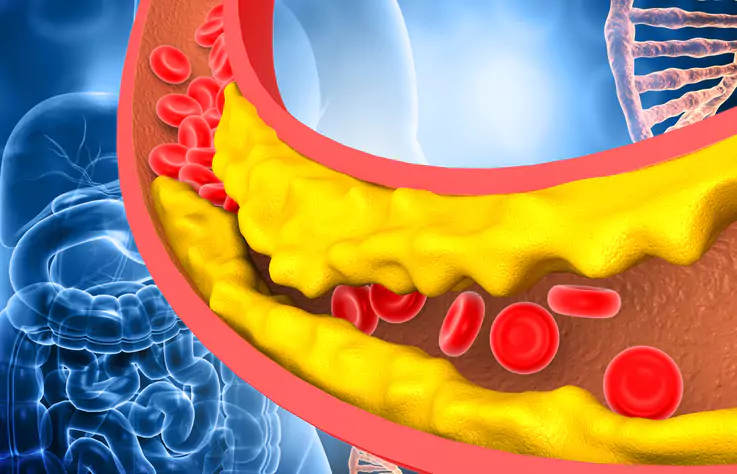






Best Way to Know You Have High Blood Potassium


Table of Contents
- What is High Blood Potassium?
- What are the Symptoms of High Blood Potassium?
- Muscle Weakness
- Confusion
- Nausea
- Abnormal Heart Rhythm
- Diagnosis of High Blood Potassium
- Blood Test
- What Causes High Blood Potassium?
- When to see your doctor about high Potassium
- What Medications would help higher Potassium levels?
- Lifestyle Changes
- Dialysis for High Potassium
- Conclusion
- About The Author
Having too much potassium in your blood is a serious health condition known as hyperkalemia. While this is a less common condition, it's important to know the high potassium symptoms to look out for. In this article, we will cover the best way to know if you have high blood potassium, including the symptoms, diagnosis, causes, and treatments that may help.
What is High Blood Potassium?
High blood potassium, also known as hyperkalemia, is a medical condition characterized by elevated levels of potassium in the bloodstream, usually greater than 5.5 mEq/L. High levels of potassium can cause dangerous health consequences and are usually caused by either a disruption of the electrolyte balance or a medical condition that affects the kidneys.
It is important to recognize the signs and symptoms of high potassium so that treatment can be given as soon as possible for the best outcome. High potassium levels occur when there is an excess amount of potassium in your body compared to the amount of sodium. When this happens, your cells are unable to absorb enough sodium, leading to high concentrations of potassium in the bloodstream.
This can be caused by certain medical conditions, certain medications or a disruption in the electrolyte balance. The most common symptoms of high potassium levels include muscle weakness, cramping, tingling, and numbness. Other symptoms may include fatigue, slow heart rate, and irregular heartbeats. In extreme cases, high potassium levels can lead to paralysis and even death.
If you suspect you may have high blood potassium levels, it is important to seek medical attention as soon as possible. Your healthcare provider will be able to order a blood test to determine the exact levels of potassium in your blood. Once the potassium levels are identified, your healthcare provider can determine the underlying cause and recommend the best treatment plan for you.
Treatment may include dietary changes, lifestyle changes or medications to help lower your potassium levels. If you experience any of the symptoms of high potassium levels or suspect you may have it, it is important to seek medical attention immediately. With proper diagnosis and treatment, high potassium levels can be managed and symptoms can be relieved.
What are the Symptoms of High Blood Potassium?
One of the most common symptoms of high potassium is sudden weakness or paralysis of the limbs that can start out as mild and worsen over time. This can lead to a loss of balance or coordination, making it difficult to walk or complete daily tasks. Other symptoms may include fatigue, muscle cramping, nausea, and abnormal heart rhythms.
Additionally, some people may experience confusion, difficulty breathing, chest pain or low blood pressure.
Muscle Weakness
One of the most common symptoms of high potassium levels is muscle weakness. This can range from mild to severe and may be more pronounced in the legs and arms. Common signs and symptoms of muscle weakness include feeling tired, increased fatigue during exercise, and general body aches.
Additionally, high potassium can also cause cramping, cramping in the legs, or an inability to move some parts of the body. If you experience any of these muscle weakness symptoms, it is advised to seek medical attention for proper diagnosis and treatment.
Confusion
Confusion can arise when trying to determine whether or not someone has high blood potassium levels. It is important to be aware of the symptoms of high potassium levels in order to recognize when one may be suffering from this condition. Common symptoms of high potassium include muscle weakness, abdominal pain, tingling or numbness in the extremities, and changes in heart rate.
Additionally, a person with high potassium levels may experience confusion, fatigue, and nausea. It is important to seek medical attention if any of these symptoms are present in order to properly diagnose and treat this condition.
Nausea
Nausea is one of the most common high potassium symptoms. This symptom can range from mild to severe, depending on the individual and the severity of their high potassium. In some cases, it may be accompanied by vomiting or loss of appetite.
If you notice any signs of nausea, it is important to seek medical attention immediately so that the underlying cause of the nausea can be identified and managed accordingly
Abnormal Heart Rhythm
People with high levels of potassium in their blood may experience an abnormal heart rhythm.
It is important to be aware of these symptoms and to seek medical care if they are noticed. Blood tests are the surest way to know if you have high levels of potassium in your bloodstream so it is important to keep track of your levels and any changes in symptoms.
Diagnosis of High Blood Potassium
When diagnosing high blood potassium, doctors will typically take a thorough medical history and perform a physical examination. Blood and urine tests are usually ordered to measure the levels of potassium in the body. A blood sample can reveal if the potassium level is higher than normal and this can be supplemented with an electrocardiogram (EKG) or an imaging test to check for any associated heart problems.
Blood Test
One of the best ways to know if you have high blood potassium is to get a blood test. For this test, a healthcare professional will take a sample of your blood and send it to a laboratory to be tested for potassium levels. High potassium levels can be indicative of numerous health conditions so it is important to get tested if you have any of the common symptoms of high potassium such as an irregular heartbeat, fatigue, muscle weakness, and constipation.
Additionally, your physician may also order additional tests to further assess your condition. It is important to follow your doctor's instructions and seek medical attention if you experience any of the symptoms of high potassium.
What Causes High Blood Potassium?
There are a number of potential causes for this condition, including kidney disorders, endocrine problems, medications, and dietary intake. High blood potassium can be a serious health risk and can cause complications so it is important to understand the causes and recognize the high potassium symptoms.
The kidneys are responsible for eliminating excess potassium from the body so any disruption to their regular functioning can lead to high potassium. Kidney diseases such as chronic kidney disease, lupus nephritis, and polycystic kidney disease can all lead to elevated potassium levels. Additionally, kidney failure can cause high potassium levels because the kidneys are unable to regulate the balance of potassium in the blood.
Endocrine problems such as adrenal insufficiency, hyperaldosteronism, and hypothyroidism can also cause high blood potassium. These conditions cause the body to produce too much or too little of certain hormones that can disrupt the body’s balance of potassium and lead to elevated potassium levels. Certain medications can also increase potassium levels.
Some diuretics, known as potassium-sparing diuretics can cause the body to retain too much potassium. Similarly, non-steroidal anti-inflammatory drugs (NSAIDs), ACE inhibitors, and other medications may also cause potassium levels to rise. Finally, dietary intake can play a role in high potassium levels.
Foods that are high in potassium such as bananas oranges, potatoes, spinach, and avocados can cause potassium levels to rise if consumed in excess. Additionally, people with kidney disease should be careful with their dietary intake of potassium and be aware of their potassium-rich foods.
Recognizing the symptoms of high potassium levels is important in order to seek the appropriate treatment. Common high potassium symptoms include fatigue, muscle weakness, irregular heartbeat, paralysis, and abdominal pain. If you experience any of these symptoms, you should seek medical care immediately. Additionally, your doctor may request lab tests in order to check your potassium levels.
When to see your doctor about high Potassium
Signs and symptoms of high potassium can vary and some people may not experience any at all. However, if you experience any of the symptoms below, it is important to seek medical attention from your doctor immediately. The most common symptoms of high potassium include:
• Muscle weakness
• Nausea and vomiting
• Fatigue
• Heart palpitations
• Abnormal heart rhythms
• Tingling or numbness of hands or feet
• Irregular heartbeat
• Difficulty breathing
If you experience any of these symptoms, it is important to see your doctor right away. During an office visit, your doctor will likely ask about your medical history, perform a physical exam, and take a blood sample to test your potassium levels.
Your doctor may also recommend other tests to help determine the cause of your hyperkalemia. These may include an electrocardiogram (ECG) to measure electrical activity in the heart, an X-ray of your chest, an echocardiogram to evaluate your heart, or other imaging tests.
Your doctor may also recommend lifestyle changes or certain medications to help lower your potassium levels and reduce your risk of developing further complications. It’s important to take high potassium levels seriously as they can cause serious health complications if left untreated.
If you have any of the symptoms listed above, be sure to see your doctor right away. With the right diagnosis and treatment, you can get your potassium levels under control and reduce your risk of further complications.
What Medications would help higher Potassium levels?
When it comes to managing higher potassium levels, there are a variety of medications that may be prescribed. Potassium-sparing diuretics, like spironolactone and amiloride, help to prevent the body from excreting potassium in the urine and can help to raise potassium levels.
Some medications can also be prescribed to help decrease extracellular fluid and reduce the amount of potassium that is excreted by the kidneys. These include thiazide diuretics, like hydrochlorothiazide and loop diuretics, like furosemide. In cases of hyperkalemia, a type of calcium channel blocker such as verapamil and diltiazem, may be prescribed to slow down the heart rate and reduce the risk of cardiac arrhythmias.
Oral medications, like angiotensin-converting enzyme (ACE) inhibitors and angiotensin receptor blockers (ARBs), can also be used to help control blood pressure and may help to lower potassium levels. Potassium-binding agents such as sodium polystyrene sulfonate and calcium acetate can be used to help lower potassium levels.
They work by binding to potassium in the intestine and preventing it from being absorbed into the bloodstream. Insulin and IV glucose can also help to lower potassium levels in the body. Overall, it is important to discuss the best treatment option for high potassium levels with your doctor. With the right treatment and lifestyle changes, individuals can safely and effectively manage their potassium levels.
Lifestyle Changes
Making changes to your daily habits and routines can be a powerful tool for identifying and addressing high potassium levels. One of the easiest places to start is your diet. Limiting your consumption of processed foods that are high in preservatives and additives can help reduce the amount of potassium in your body. Incorporating more whole foods such as fruits and vegetables, into your diet can provide your body with the essential nutrients it needs to function at its best.
In addition to diet, exercise can also play a role in managing potassium levels. Regular exercise helps keep your heart healthy and can help flush out excess minerals and fluids from your body, reducing the risk of high potassium levels. It’s important to talk to your doctor before starting a new exercise routine, especially if you have any underlying health conditions.
By being proactive and monitoring your lifestyle, you can identify the early signs of high potassium levels and take steps to address them before they become a serious health concern. With the right habits and routine, you can ensure that your body has the balance of potassium it needs to function at its best, leading to improved overall health and well-being.
Dialysis for High Potassium
Dialysis is a medical procedure used for removing waste products and excess fluids from the bloodstream when the kidneys are not functioning properly. It is also used to help control levels of electrolytes such as potassium, in the body. High potassium or hyperkalemia is a condition where the levels of potassium in the blood are higher than normal.
This can be dangerous and even life-threatening if not treated as it can cause heart problems, muscle weakness, and even heart failure. There are two main types of dialysis used for high potassium: hemodialysis and peritoneal dialysis. Hemodialysis involves using a machine to clean the blood outside the body.
Blood is pumped from the body through a dialysis machine that uses a special filter to remove waste products and excess fluids, including potassium. The clean blood is then returned to the body. This procedure is typically performed three times a week for about three hours each time.
Peritoneal dialysis involves using a special fluid called dialysate that is placed into the abdomen through a catheter. The dialysate helps remove waste products and excess fluids, including potassium, from the blood. The fluid is then drained from the abdomen and the process is repeated. This procedure can be performed at home and can be done several times a day.
In addition to dialysis, dietary changes and medications may also be used to control high potassium levels. This includes reducing potassium-rich foods such as bananas oranges and potatoes, in the diet. Medications such as potassium-binding resins and sodium polystyrene sulfonate can also help remove excess potassium from the body.
It is important to note that dialysis is only necessary for people with severe cases of high potassium. Most people with high potassium can control their levels with dietary changes and medications. Regular monitoring of potassium levels is important to ensure they remain within a safe range. In conclusion, dialysis can be an effective way to control high potassium levels in people with severe cases of hyperkalemia.
It is important to work closely with a healthcare provider to determine the best course of treatment. Regular monitoring and adherence to dietary restrictions and medications can also help maintain healthy potassium levels.
Conclusion
In conclusion, high blood potassium or hyperkalemia is a serious medical condition that needs to be addressed immediately. The symptoms of high potassium are often mild and can range from muscle weakness to confusion to nausea. A blood test is the best way to know if you have high blood potassium and is the only way to accurately diagnose the condition.
The causes of high blood potassium can vary widely and can include some medications, kidney problems, and Addison’s Disease. If you have high potassium, your doctor will likely recommend some lifestyle changes, medications, and possibly surgery or dialysis depending on the severity of your condition.
No matter what cause or treatment you have, it is important to stay in close contact with your doctor to monitor your progress and make sure your potassium levels remain in a healthy range.
About The Author
Meet Dr. Ahmet Ergin, a highly skilled and dedicated endocrinologist with a passion for diabetes care. Dr. Ergin's journey in the medical field began with earning his medical degree with honors from Marmara University School of Medicine in Istanbul, Turkey.
He then went on to complete his internal medicine residency and endocrinology fellowship at Cleveland Clinic, one of the top medical centers in the United States, located in Cleveland, Ohio. With a wealth of knowledge and experience in his field, Dr. Ergin is board-certified in Internal Medicine, Endocrinology, Diabetes, and Metabolism, making him a respected and highly qualified physician.
He is also a certified diabetes education specialist, the author of the book "The Ultimate Diabetes Book" and the founder of the SugarMD YouTube channel where he shares valuable insights and information on diabetes management and care. Currently, Dr. Ergin practices in Port Saint Lucie, FL where he provides exceptional care to his patients and helps them to effectively manage their diabetes.
It is important to note that the information on diseases and treatments provided on this website is for general guidance only and should never be considered a substitute for the advice provided by a qualified healthcare professional. Always seek the advice of your physician, health provider, or other qualified healthcare professional with any questions you may have regarding your health.
Written By Dr. Ahmet Ergin
456 total articles
Meet Dr. Ahmet Ergin, a highly skilled and dedicated endocrinologist with a passion for diabetes care. Dr. Ergin earned his medical degree with honors from Marmara University in Istanbul. He completed internal medicine residency and endocrinology fellowship at Cleveland Clinic. Dr. Ergin is board-certified in Internal Medicine, Endocrinology, Diabetes, and Metabolism due to his vast medical expertise. He's a certified diabetes educator, author of “The Ultimate Diabetes Book,” and founder of “the SugarMD YouTube channel.” Dr. Ergin offers exceptional diabetes care to his patients in Port Saint Lucie, FL, helping them manage effectively. For a closer look into his insights and experiences, connect with Dr. Ahmet Ergin on LinkedIn, Instagram, and YouTube.”
Disclaimer: These statements have not been evaluated by the Food and Drug Administration. Information on this website isn't intended to treat, cure or prevent any disease. Discuss with your doctor and do not self-treat.
Products











